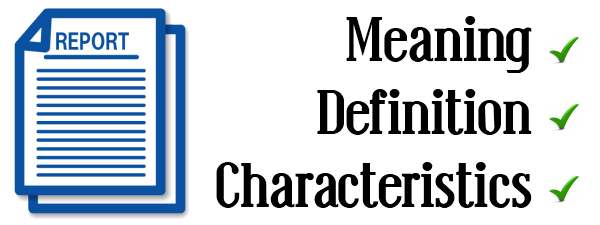Report | Meaning and Definition | Characteristics
Introduction

Report is a message presented before the management after making detailed inquiry or investigation with or without opinions or recommendations.
In other words, report conveys the information which are used to find the fact or to assist in decision making or solving any business problems. Generally, report is prepared and presented according to the needs of the top management.
The word “Report” is derived from the Latin word of “reportare” which means carry back. Re means back and portare means to carry. Therefore, a report is a description of an event carried back to someone who was not present on the scene.
Meaning of Report
A report is an organized statement of facts relating to a particular subject prepared by reporter(s) after making independent inquiry or investigation with or without opinions or recommendations.
Definition of report
M.C.Shukla and S.S.Gulshan,
“A report is any written or oral communication in which according to the nature and purpose of the report, the reporter presents a collection of facts or a number of alternative propositions, states his conclusions and (if called upon to do so) submits his recommendations”.
Rohini Aggarawal,
“A report is an orderly and objective presentation of information that helps in decision making and problem solving”.
C.A.Brown,
“A report is a communication from someone who has some information to someone who wants to use this information”.
Characteristics or Features of a Report
The followings are the features of the Report.
1. Precise: The reporter should be very clear in drafting a report. If so, he/she may present the report very precisely with coherence and makes it a valuable document.
2. Accuracy: The construction of sentences brings accuracy of the disclosed information. Besides, there is no ambiguous in understanding. Spelling mistake irritates the reader. Faulty punctuation may mislead the meaning.
3. Only Facts: The management is going to take a decision on the basis of the factual information available in the report. Inaccurate facts may lead to faulty decisions.
4. No Grammar Mistake: All the rules relating to grammar should be followed while drafting a report. The quality and validity of the report is affected due to grammar mistake.
5. Relevance: Only relevant information must be included in the report. Irrelevant information should not be included in the report. If relevant information is not included, the report is incomplete. If irrelevant information is included the readers are confused.
6. Simple Language: Simple sentences can be used for drafting a report. Lengthy sentences should be avoided. A report should be understood by an ordinary layman.
7. Unambiguous Language: The report should be free from ornamental language. Unknown words, unfamiliar words and double meaning words should not be used while drafting a report. Idioms and Phrases may be used if required for proper understanding of the subject.
8. Reader Orientation: It is necessary to keep in mind the person(s) who is (are) going to read the report. There must be an attraction in the report while reading the same.
9. Arrangement of Matters: The subject matter of the report should be symmetrically arranged. If so, the readers can understand the report in the right direction.
10. Clarity: Clarity depends on proper arrangement of facts. The report can be presented in the order of introduction about the preparation of the report, objectives of report, sources of data, methodology used for collecting the data, findings and finally recommendations. These are presented in the form of short paragraphs with suitable main headings and sub-headings to achieve greater clarity.
